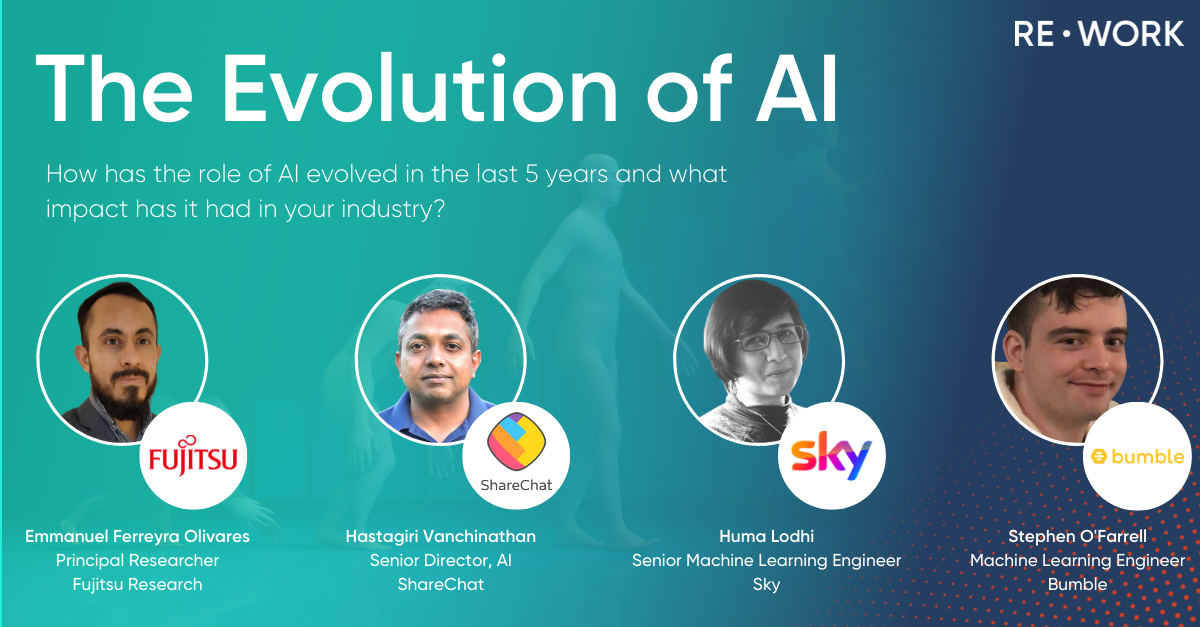AI has become one of the most powerful tools in modern history and it’s emergence has reshaped the world we live in and today's industries. Ahead of the RE•WORK London AI Summit we asked leading experts from Bumble, Fujitsu Research, Sky and ShareChat how the role of AI has evolved in the last 5 years and what impact it has had across industries? Here's what they had to say:
Stephen O'Farrell - Machine Learning Engineer - Bumble
A trend that we have seen recently is an increased pressure to deliver business value and have a clear product impact, whereas in the past it was a lot easier for companies to “burn” money for research and innovation, so to speak. In the next 5-10 years we may see big papers and interesting advancements almost exclusively coming from academia and the likes of Google, Facebook, Tencent, etc.
"A trend that we have seen recently is an increased pressure to deliver business value and have a clear product impact"
Emmanuel Ferreyra Olivares - Principal Researcher - Fujitsu Research
In the last five years, AI has received increased attention. However, parallelly there has also been uncertainty and mistrust. Despite these concerns, academia and industry acknowledge the potential of AI to solve complex problems. As a result, we observe novel AI propositions that move beyond high-level visions to disruptive AI-based solutions.
Consequently, the role of AI in the industry has grown on various fronts. For example, in the connected businesses front, AI-based solutions help handle customer engagement, automate business-to-business operations and power Internet-of-Things initiatives. AI powers decision support systems, bots, and electronic assistants on the intelligent assistance front and enables advanced analysis and planning solutions. On the operational efficiency front, AI is used for industrial process automation. Finally, on the security front, AI is leveraged to automate risk monitoring and management and execute cyber strategies for risk prevention, detection, and mitigation.
"Academia and industry acknowledge the potential of AI to solve complex problems"
Huma Lodhi - Senior Machine Learning Engineer - Sky
AI has evolved as the most significant technology over the last five years, and we have observed improvements in areas including natural language processing, vision, speech analysis, planning and decision making. It is disrupting and revolutionising many industries. For example, AI is helping in estimating personalised premium and automated settling of claims in insurance. AI is generating recommendations for shopping an item and for watching the next TV show or movie. In Healthcare it is improving medical diagnosis and early detection of diseases.
"We have observed improvements in areas including natural language processing, vision, speech analysis, planning and decision making"
Hastagiri Vanchinathan - Senior Director, AI - ShareChat
Apart from the big tech firms where AI has been pretty central for over 10 years now, AI has permeated quite a few other industries in the last 5 years. Quite a few companies' leaders now have an AI strategy and a team that occupies a fairly important position in the org and strategy of the company. In terms of impact, we are seeing more and more business use cases becoming possible or being made much better due to the use of AI. On the flip side, there has been quite a bit of worrisome developments in the areas of fairness, explainability and accountability, privacy where the decisions based on AI models are not very easy to explain and it is very difficult to reason about what the model knows.
"Companies' leaders now have an AI strategy and a team that occupies a fairly important position in the org and strategy of the company"

Want to learn more?
Huma, Hastagiri, Emmanuel and Stephen, will all be speaking at the upcoming Deep Learning Summit this September (14-15). Join them and many more AI/ ML and Deep Learning experts to learn more about the latest trends and opportunities in your industry.
Attendees can join sessions across all 3 stages at the RE•WORK London AI Summit with just one ticket. Early Bird Passes end on Friday 22 July so book your place today.
For more information contact [email protected].
